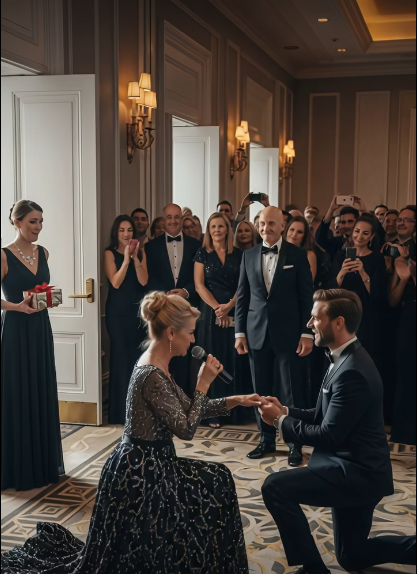I zipped up my black evening gown, the silk cool against my skin. On the dresser, a vintage Omega watch sat wrapped in silver paper, my anniversary gift to Henry. Beside it, his phone buzzed. A message from Kristen Blackwood, his boss and Boston’s most ruthless venture capitalist, lit up the screen. I shouldn’t have looked. But a cold premonition, a feeling I’d been ignoring for months, guided my hand.
The proposal will happen during my keynote speech, her message read with clinical precision. Isabella’s emotional breakdown will justify the ownership restructuring we discussed.
The room tilted. My anniversary gift transformed from a symbol of love into evidence of my own naivete. The silk of my dress, once elegant, now felt like armor. Henry stood in our marble bathroom, humming while he adjusted his bow tie, completely unaware that his phone had just revealed six months of coordinated deception. The messages painted a chilling picture of calculated manipulation, with my husband and his boss orchestrating my public humiliation to seize control of Nexus Dynamics—the company I had built with my Harvard Law expertise and coding genius.
My fingers traced the edges of the gift box containing the $25,000 watch. The irony was suffocating. I had spent weeks researching the perfect gift, while he spent those same weeks planning my corporate execution.
“Isabella, have you seen my cufflinks?” Henry called, his voice carrying the easy confidence of a man who believed his secrets were safe.
I retrieved the platinum cufflinks from his jewelry box, my hands steady despite the earthquake in my chest. They bore the Nexus Dynamics logo, a symbol I had designed during our startup phase, back when partnership meant equality.
Our Back Bay penthouse, with its floor-to-ceiling windows framing Boston Harbor, was a monument to our success. Every piece of custom Italian furniture, every piece of original art, told the story of Nexus Dynamics’ meteoric rise. What the elegant surroundings didn’t convey was the mathematical truth hidden in our home safe: I owned 67% of the company. Henry held only 33%. The distribution was based on my grandmother’s inheritance funding our initial operations and my innovations generating every dollar of our current wealth.
Elena Santos, my grandmother, had worked three jobs to build a small technology consulting firm in the 1980s. She left me her life savings with a handwritten note in Spanish: Para mi nieta brillante, build something that matters and never let anyone take credit for your work. Her words echoed in my mind as I realized I had violated her most important lesson.
The morning routine had been a carefully choreographed performance. Henry rehearsed his keynote speech, stumbling over terminology I had taught him during countless late-night sessions. The technical foundations of his reputation rested entirely on algorithms I had developed during eighteen-hour coding marathons. My reflection in the mirror showed a woman I barely recognized: Isabella Martinez, Harvard Law graduate turned computer scientist, now reduced to a supporting actress in her own professional biography.
“You look beautiful tonight,” Henry said, the compliment carrying the hollow ring of automatic politeness. His eyes held no trace of guilt. I wondered how long he had been practicing this role, how many mornings he had looked at me while planning my destruction.
Our early conversations had spanned hours, debating technical possibilities and business strategies. Gradually, those exchanges had transformed into one-sided tutorials where I explained complex concepts while he nodded and took notes. The evolution had been so subtle that I had mistaken intellectual theft for partnership.
Tonight, I was to attend our company’s most important event as Henry’s wife, not as the architect of the innovations being celebrated. The limousine glided through Boston’s financial district. Henry’s phone continued its relentless buzzing. He quickly silenced each notification without reading, a practiced efficiency that suggested this had become routine.
“Kristen has some innovative ideas about expanding our market reach,” Henry said, his enthusiasm for her business acumen making my chest tighten. The way he said her name had evolved over recent weeks from professional respect to something approaching reverence. He was preparing me, laying the groundwork for the coup.
The ballroom at the Meridian Grand Hotel was a spectacle of corporate excess. Crystal chandeliers cast prismatic light across marble floors. Three hundred of Boston’s most influential leaders moved through the space with choreographed elegance. Henry’s hand settled on my lower back as we entered, but his eyes were already scanning the crowd for someone else.
“Isabella, you look stunning,” commented a board member, her compliment feeling perfunctory, her attention focused on Henry. The subtle shift in social dynamics suggested others had noticed the cracks in our marriage before I had.
Then I saw her. “There’s Kristen,” Henry said, his voice warm. Kristen Blackwood commanded attention. Her reputation preceded her, but tonight she carried an additional authority that suggested a special significance to this gathering.
The dinner service proceeded with military precision. I was seated at the head table beside Henry, with a perfect view of the stage. The seating arrangement felt deliberately designed to ensure my visibility during the performance that had been planned for my benefit.
As dessert was served, the Master of Ceremonies announced the keynote speaker. “Please join me in welcoming Kristen Blackwood, whose vision for strategic partnerships continues to revolutionize our industry.”
The applause was genuine. Kristen approached the podium, her confidence radiating through the room. “Tonight,” she began, her voice carrying clearly, “we celebrate not just financial success, but the personal relationships that make transformative partnerships possible.”
Her speech shifted into more personal territory. The energy in the room became electric, a kind of bloodlust disguised as entertainment. The guests sensed drama. When Kristen stepped away from the podium, a handheld microphone in her hand, the crowd’s reaction confirmed my worst fears. Three hundred phones emerged simultaneously to capture my destruction in high definition.
She dropped to one knee.
“Henry Martinez,” Kristen said, her voice a blade of clinical precision. “Will you leave your poor, impotent wife and marry me?”
The words struck like physical blows, each syllable calculated for maximum humiliation. The public branding of me as “poor” and “impotent” was character assassination designed to justify the corporate restructuring that would follow, reducing my identity to an obstacle that needed to be removed.
Henry’s acceptance came without hesitation. “Yes,” he said, his voice strong and clear. The word echoed off the marble walls like a gunshot.
The applause that followed sounded like artillery fire in my ears as three hundred guests celebrated the systematic destruction of my life. I watched my husband embrace Kristen while cameras flashed, documenting the moment my marriage officially became performance art for someone else’s corporate advantage.
The crowd expected tears, a dramatic confrontation, an emotional collapse. I chose something far more dangerous: dignified silence. My refusal to perform created an uncomfortable energy that began to dampen the celebration. My heels clicked against the marble as I walked toward the exit, each step measured and deliberate. The gift box remained clched in my hands, no longer a gesture of love, but evidence of the last kindness I would ever show a man who had mistaken my generosity for weakness.
The penthouse elevator ascended through thirty floors of silence, each level marking my transition from victim to strategist. The wedding photograph on our living room wall smiled back with cruel irony. Behind it, the wall safe contained six years of careful documentation, the mathematical truth of our partnership.
The incorporation papers, which I had drafted, established my 67% ownership. The patent filings, bearing my name as primary inventor, detailed every innovation that generated our wealth. The bank records showed my grandmother’s inheritance as the initial funding that transformed Henry’s ambitious ideas into operational reality. These documents were more than legal protection; they were weapons.
My laptop connected to Nexus Dynamics’ financial systems with passwords only I knew. The security architecture I had built to protect our company from external threats would now defend it from an internal one. The records displayed a story of systematic exploitation: $27 million in personal expenses disguised as business development. European investor tours, Caribbean strategy retreats, Manhattan networking events that cost more than most companies’ annual budgets. Every receipt told the story of a man who had confused access with ownership.
My fingers hovered over the keyboard. The woman who built the system retained ultimate authority over its operation.
The network shutdown began with surgical precision. Corporate credit cards were declined. Hotel reservations for the European Investor Tour vanished. The payroll system showed insufficient authorization. Vendor invoices were rejected. The operational freeze locked $27 million behind protocols that required my personal approval, instantly transforming the celebrated co-CEO into a man who could not access a penny of the company he claimed to run.
My phone began buzzing with panicked calls. The legal document I drafted was the culmination of everything I had learned. It was a corporate death sentence disguised as a settlement. The terms were simple and non-negotiable:
- Immediate resignation as co-CEO.
- A permanent ban on Kristen Blackwood’s involvement with Nexus Dynamics.
- $27 million in structured repayment over four years.
- Public acknowledgement of my true role as founder and majority owner.
- A comprehensive non-disclosure agreement, preventing him from ever monetizing the story of a success he hadn’t earned.
The sealed envelope sat on the coffee table like a legal explosive device.
At 11:45 p.m., desperate knocking echoed through the penthouse. I opened the door to find a man who had spent twelve hours discovering that his perfect plan had become a perfect disaster.
“Isabella, we need to talk,” he said, his voice carrying the hollow authority of a king without a kingdom.
I remained seated on the sofa, the legal documents spread between us.
“You have to understand,” he began, his words tumbling out. “Kristen’s proposal… it was a test, a way to make you fight for our marriage.”
The delusion was breathtaking. “Henry,” I said, my voice steady, “you spent twenty-seven million dollars of my money. The math is not complicated.”
I laid out the incorporation papers, the patents, the bank records. I watched him crumble against the mathematical evidence that his ownership was a fiction.
When he suggested using Kristen’s recorded proposal as leverage, I pulled out my phone and deleted the video in front of him. His last hope for redemption disappeared into digital nothingness. “I don’t need blackmail, Henry,” I told him. “I have mathematical truth.”
His hands trembled as he signed each page, his pen moving with the desperate efficiency of a man who finally understood he had been playing poker with the casino owner. The surrender document became his confession, a legal admission that six years of stolen credit were finally being returned.
The emergency board meeting convened at 8 a.m. The ten members arranged themselves around the mahogany table with expressions ranging from confusion to panic.
“Good morning,” I said, settling into the chair at the head of the table. “Henry Martinez has submitted his immediate resignation as co-CEO of Nexus Dynamics. Effective immediately, I am assuming sole control of all company operations.”
I distributed copies of the incorporation papers, the patents, the financial records. I watched as sophisticated investors discovered they had been advising a company they had never truly understood. I read aloud the public statement Henry had signed, a complete confession that dissolved six years of stolen credit in carefully crafted paragraphs.
The transformation of Nexus Dynamics from corporate theater to authentic innovation hub was immediate. My first executive decisions prioritized substance over style. Engineers who had been presenting complex ideas to someone who could only smile and nod suddenly found themselves working with a leader who could debug their code and optimize their algorithms.
Nine months later, I stood in the kitchen of my Cambridge townhouse, brewing coffee. The modest, functional space was a world away from the Back Bay penthouse. My MIT visiting professorship had connected me with graduate students whose genuine curiosity reminded me why I had fallen in love with programming in the first place.
A handwritten letter from Henry arrived on a Tuesday. He was teaching at a community college in Portland. I realize now that you tried to teach me the difference between being important and being authentic, he wrote. I apologize that it took losing everything to finally understand.
Kristen’s reputation remained intact, but her business model had been permanently damaged by the assumption that public perception equals legal reality.
Standing in my honest kitchen, I understood that the best revenge was never about destroying others, but about finally living authentically on my own terms. The vintage Omega watch still sat unopened on my counter, a $25,000 reminder of the last gesture I had made as someone else’s supporting character before choosing to write my own script. The mathematics had worked perfectly. Actions plus consequences equaled justice. And sometimes, the best revenge is simply being right—and having the evidence to prove it.





